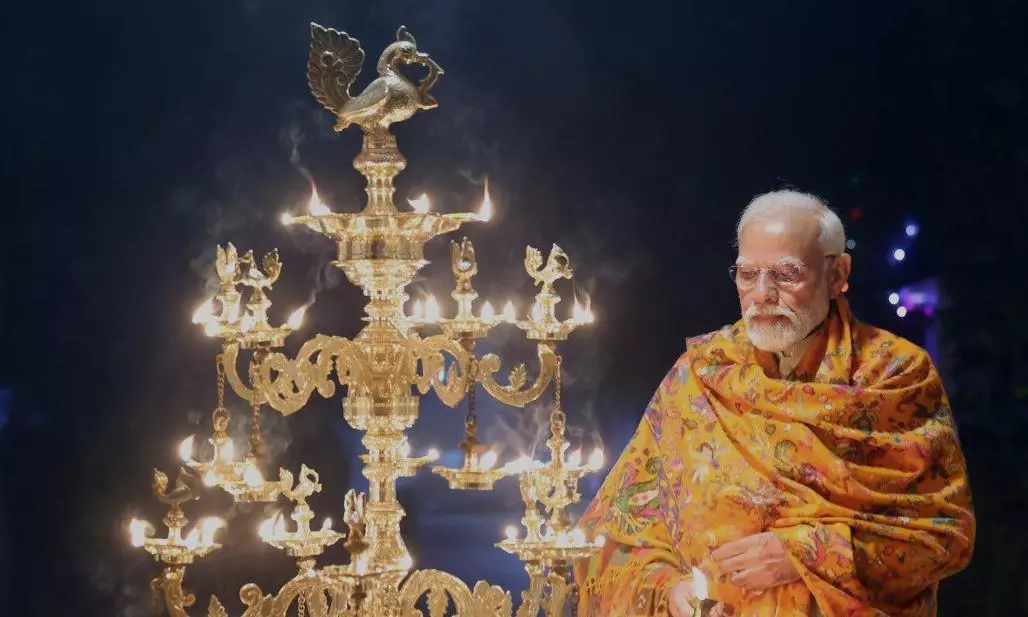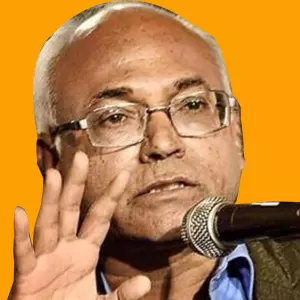
- Home
- India
- World
- Premium
- THE FEDERAL SPECIAL
- Analysis
- States
- Perspective
- Videos
- Sports
- Education
- Entertainment
- Elections
- Features
- Health
- Business
- Series
- In memoriam: Sheikh Mujibur Rahman
- Bishnoi's Men
- NEET TANGLE
- Economy Series
- Earth Day
- Kashmir’s Frozen Turbulence
- India@75
- The legend of Ramjanmabhoomi
- Liberalisation@30
- How to tame a dragon
- Celebrating biodiversity
- Farm Matters
- 50 days of solitude
- Bringing Migrants Home
- Budget 2020
- Jharkhand Votes
- The Federal Investigates
- The Federal Impact
- Vanishing Sand
- Gandhi @ 150
- Andhra Today
- Field report
- Operation Gulmarg
- Pandemic @1 Mn in India
- The Federal Year-End
- The Zero Year
- Science
- Brand studio
- Newsletter
- Elections 2024
- Events
- Home
- IndiaIndia
- World
- Analysis
- StatesStates
- PerspectivePerspective
- VideosVideos
- Sports
- Education
- Entertainment
- ElectionsElections
- Features
- Health
- BusinessBusiness
- Premium
- Loading...
Premium - Events

Modi has managed to arm-twist the RSS into accepting his version of Hinduism, with his strong grip over the BJP and the OBC vote-bank
The upcoming general elections are set to establish a new relationship between the Indian constitutional democratic state and ‘Sanatana Dharma’ – a phrase used by the Sangh Parivar to define its version of Hinduism.
Prime Minister Narendra Modi is playing a skillful role to de-secularise the Indian state with the conscious support of the massively-grown monopoly capitalist class of western India.
Quite consciously and systematically, the film industry has also been integrated into the whole process of de-secularisation of the nation-state. Three networks – the RSS-BJP combine and the state institutions under its control, the monopoly capitalist class, and the cinema industry – have joined hands to use temples against schools, which are a natural ally of modern democracy.
Ideally, it is schools that run the state. But it won’t be long before temples replace schools in charting the future of the nation.
The PM who is a ‘priest’
The process took a new turn with the prime minister's inauguration of the Ram temple in Ayodhya. The event wasn’t just well-timed, coming days ahead of the Lok Sabha polls, but saw an enormous participation of people from all walks of life.
The magnitude of the whole affair stopped the Left-wing intelligentsia and secular parties like the Congress and the Left in their tracks. Their old methodology failed to give them a clue on how to respond to the development or take the next step forward.
It was a unique event where a prime minister, hailing from the OBC community, consecrated the idol (of Ram Lalla) in the sanctum sanctorum of the temple. This gave Modi the dual identity of a Prime Minister and a ‘priest’, something that India had not seen so far.
RSS caught surprised
Even though the RSS, the ideological fountainhead of the BJP, wouldn’t have traditionally allowed the prime minister to take up the double role, the organisation clearly did not see it coming. It was evident that Modi, who rose through the ranks – from a grassroots worker to the most influential figure in the party – now has an iron grip on all matters.
After the consecration of the Ram temple in Ayodhya, Modi appears to have taken over the position of priest with his own ideological operation. Just before the consecration of the temple on January 22, 2024, he made an 11-day tour of temples of South and North India. He declared that he was fasting for 11 days to "purify" himself. He performed all sorts of rituals in several temples. Even after the temple consecration, he continued with his ritual performance in many temples.
Shunning old traditions
Notable was the way Modi snubbed traditional Hindu practices to assert his version of religion, displeasing the Shankaracharyas in the process.
As he is an OBC from the Modh Ghanchi community of Gujarat, his role as consecrator of the Ram temple was opposed by the Shankaracharyas, religious heads who are heading the four Adi Shankara ‘peeths’ or ‘mathas’ in the country. The peeths, which are Shaivite-Brahminic centres, can only be headed by Brahmins.
Shudras, Dalits and Adivasis, whom the RSS and BJP are organising into a major vote bank, have no interaction with these peeths as they practise a strict ‘varna’ system (social hierarchy). These mathas are not mass devotional centres like Tirupati or like ‘Sammakka Sarakka Theertham’ of Telangana.
While the boycott by the Shankaracharyas had little impact on Modi, the RSS also remained indifferent to it, keeping the larger picture in mind.
Powered by capitalists
Since the Ram temple issue is the product of a long-drawn ideological fight against India’s Islamic past, the BJP was successfully able to rally the capitalist class around the cause.
The decades between 1992 and 2024 saw a majority of Indian industrialists embracing the Hindutva ideology. Top industrialists from western India, mostly from Mumbai and Gujarat, established deeper relations with Modi and BJP leader and Union Home Minister Amit Shah, particularly from 2002 onwards – the year the intercommunal riots in Godhra polarised Gujarat.
Getting the monopoly capitalist class to support the Ram temple cause was a herculean task even for Uttar Pradesh Chief Minister Yogi Adityanath. But it was Modi and Shah who carefully organised the whole network.
But, in the process, the state apparatus moved to the control of top industrialists of the country. And India is not China, where pure authoritarianism of state power can control even the monopoly capital when it is getting out of hand.
All for ‘Hindu Vatican’
The Ram temple, which is becoming a mass devotional centre drawing pilgrims in lakhs, is being endorsed not just by industrialists and film stars who are donating money and gold, but also by NRIs. All this to project it as a Hindu version of the Vaticanor Mecca.
Not just that, the Sangh Parivar is also making every effort to bring tribal shrines and rituals under its version of Hinduism. Seeing the popularity of the Sammakka Sarakka Theertham, a tribal fair in Telangana which draws lakhs of devotees every year, the Union government last year named the new Tribal Central University at Mulugu as Sammakka Sarakka University. The fair this year is said to have drawn over 4 crore devotees.
The RSS-BJP has also Sanskritised several tribal temples by installing Brahmin priests there. The Koya tribes of Mulugu were opposed to this strategy of the Sangh Parivar, but Modi managed to outwit them by naming the tribal university after Sammakka and Sarakka, two tribal goddesses they worship.
Behind Modi’s unquestioned authority
The most critical question is why the RSS gave a free hand to Modi, allowing him to don the role of a priest even at the cost of snubbing the Shankaracharyas, whose word is considered sacrosanct in Hindu religion.
The answer lies in ‘Hinduising’ the state and ‘stateising’ the religion. Modi has become an agent of this new process. He has managed to arm-twist the Brahmin-led RSS into accepting his version of Hinduism with his strong grip over the BJP and the OBC support he enjoys.
Even when Atal Bihari Vajpayee was the Prime Minister, the RSS did not depend on him as much as it depends on Modi for managing the state and religious affairs.
This is an unexpected development in modern constitutional democracy. And this has been possible because of the unwavering support of the monopoly capital class to Modi.
Even RSS cadres – although they continue to be in denial – have come to adopt a new lifestyle, including the patronage of industrialists, state protection, security, and capitalist comforts. They have come to understand what ‘Ram Rajya’ means. Modi has become the deliverer of that ‘Rajyasukha’ to RSS and BJP leaders and cadres after about 100 years of waiting for it.
(The Federal seeks to present views and opinions from all sides of the spectrum. The information, ideas or opinions in the article are of the author and do not necessarily reflect the views of The Federal.)


